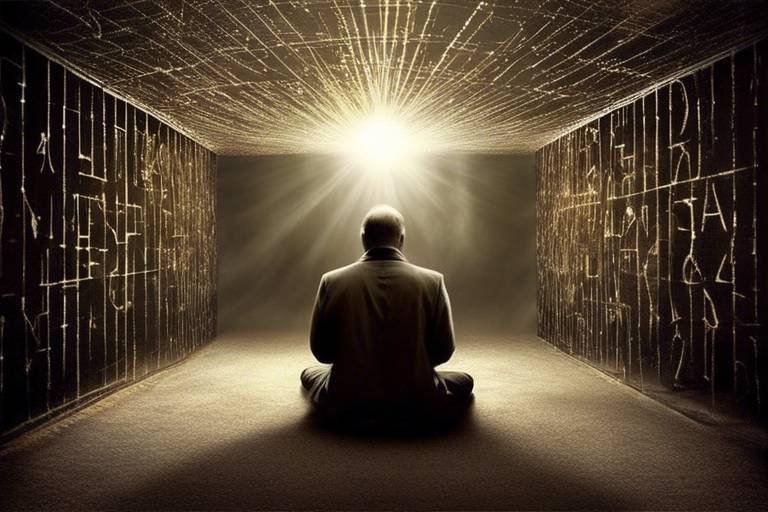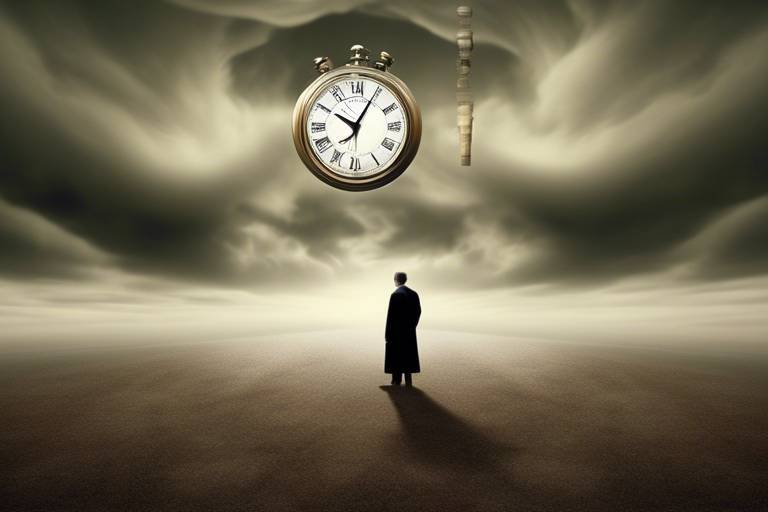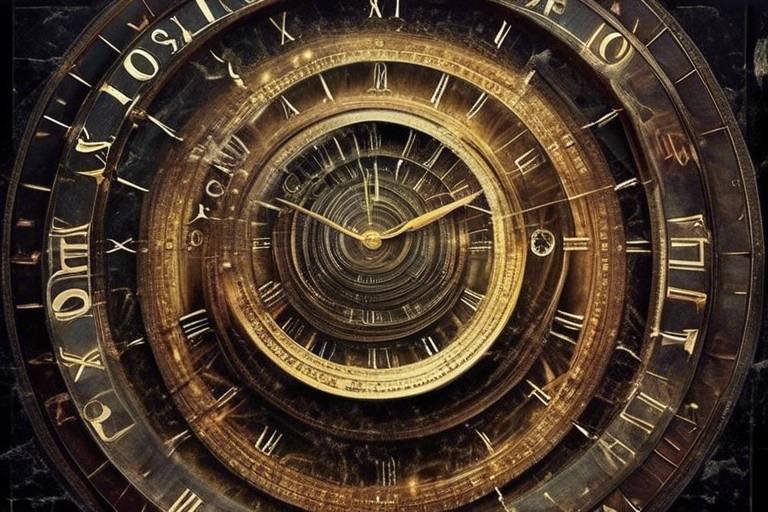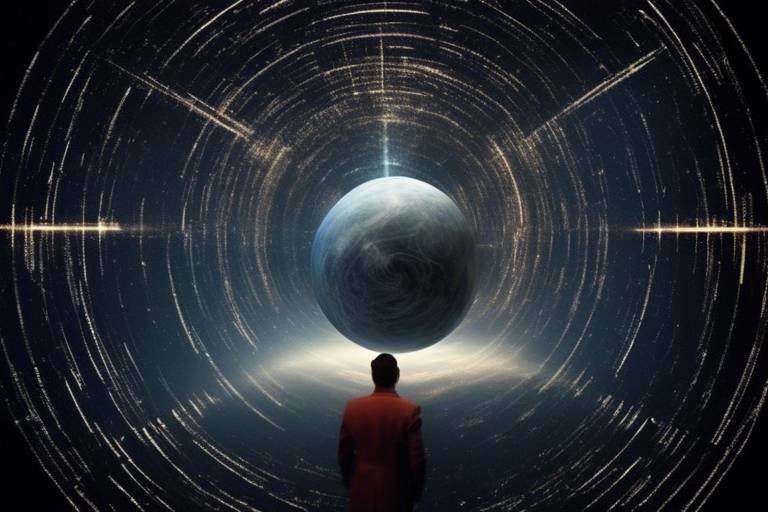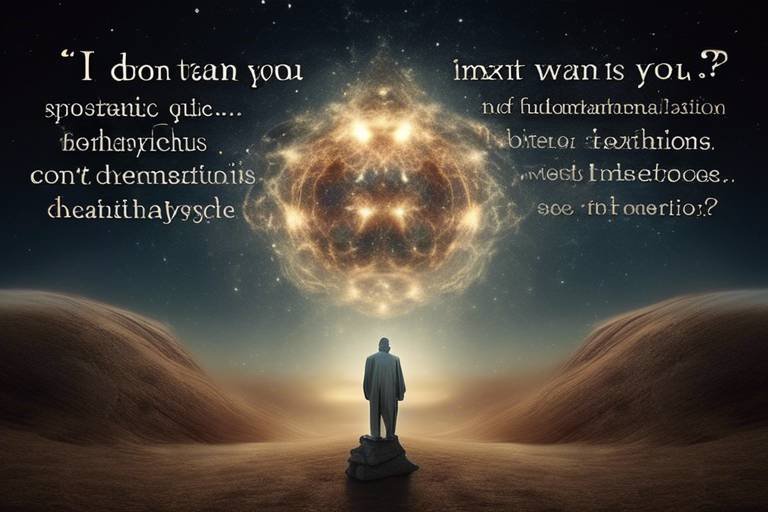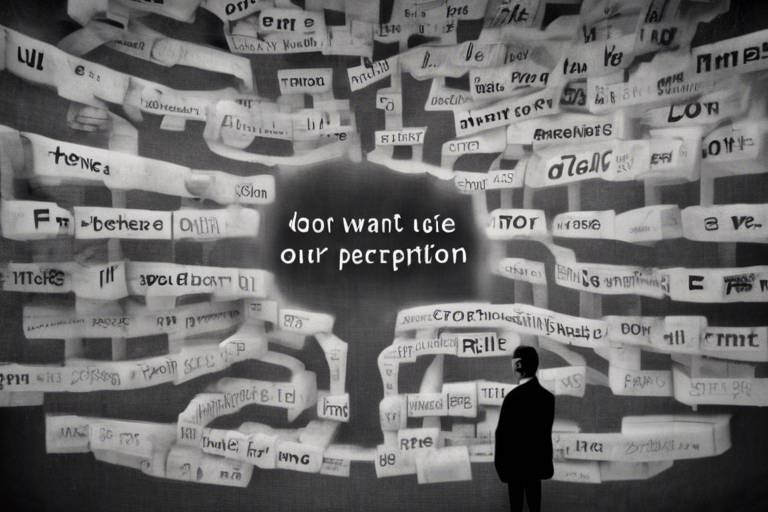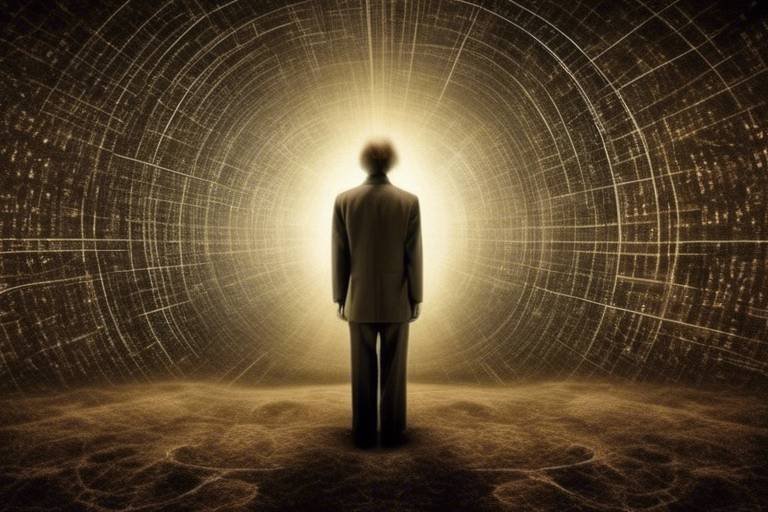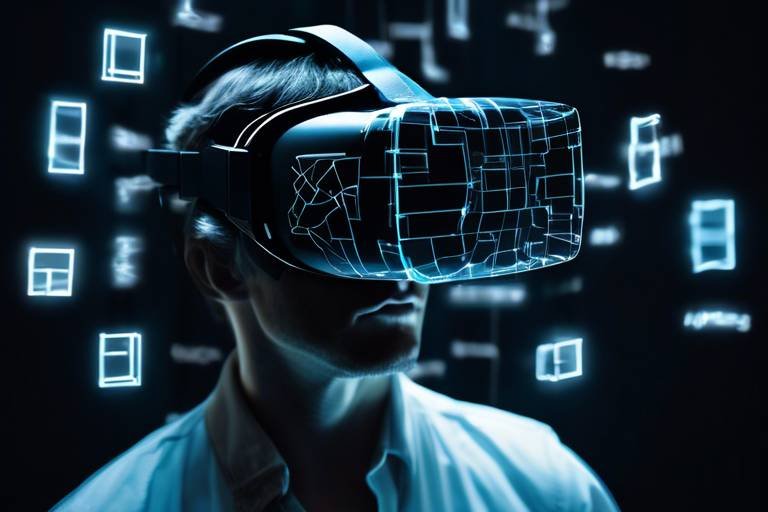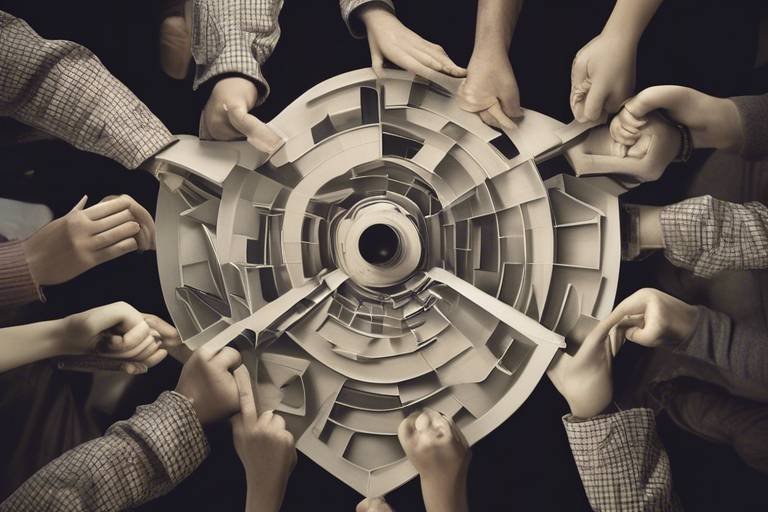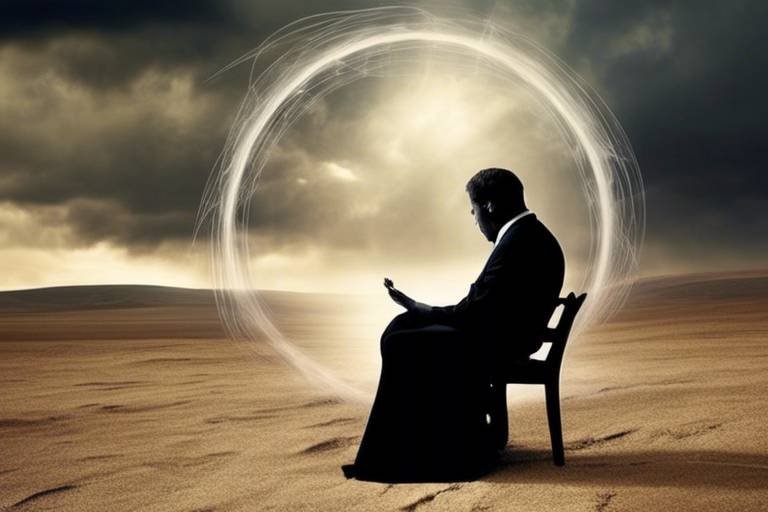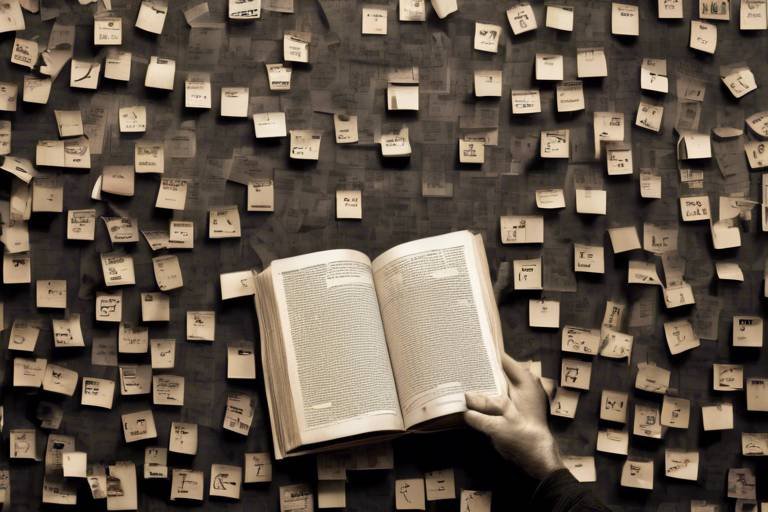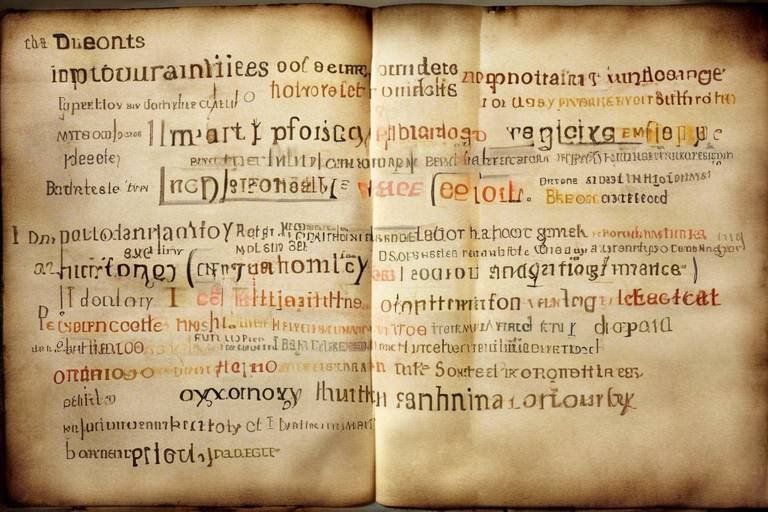Metaphysics - Are We Bound by Fate or Free Will?
Welcome to the fascinating world of metaphysics, where the age-old debate of fate versus free will takes center stage. Have you ever wondered if your life is like a scripted play, where every scene is preordained, or if you’re the director, making choices that shape your own destiny? This philosophical conundrum has puzzled thinkers for centuries, igniting discussions that span cultures, religions, and intellectual traditions. In this article, we will explore the intricate layers of this debate, delving into the implications of both perspectives on our understanding of human agency and existence itself.
Fate, often depicted as a mysterious force, is perceived by many as a predetermined course of events that we are powerless to alter. Imagine walking down a path where every step is already laid out before you—this is the essence of fate. Various interpretations exist, from the ancient Greek notion of the Moirai, or Fates, who spun the threads of human life, to modern interpretations that see fate as a cosmic plan or destiny. But how does this notion shape our lives? When we believe in fate, we might feel a sense of comfort, thinking that everything happens for a reason. Yet, this can also lead to a passive approach to life, where we relinquish control over our decisions, attributing our successes and failures to the whims of fate.
On the flip side, the concept of free will asserts that individuals possess the power to make choices independent of external influences. This idea is liberating, suggesting that we are the architects of our own lives. Free will invites us to take responsibility for our actions, leading us to ponder questions like, "If I can choose, then what does that mean for my moral accountability?" The implications are profound—if we are truly free, our choices define who we are, and we hold the reins to our destinies. However, the idea of free will also comes with its own set of challenges, as it raises questions about the influence of genetics, environment, and societal factors on our decision-making processes.
The conflict between determinism and free will is at the heart of this philosophical debate. Determinism posits that every event or action is the result of preceding events, governed by the laws of nature. Picture a giant domino effect: one event triggers another, leading to a chain reaction that ultimately shapes our lives. On the other hand, advocates of free will argue that human beings can transcend these predetermined paths, making choices that defy the dictates of fate. This tug-of-war raises essential philosophical questions, such as: Can we truly be held accountable for our actions if they were predetermined? And if we have free will, what does that mean for the concept of fate?
Different philosophical schools offer varying perspectives on determinism. For instance, the Stoics believed in a form of determinism that emphasized acceptance of fate, suggesting that while we cannot control external events, we can control our reactions to them. Conversely, existentialists argue for radical freedom, positing that individuals are responsible for giving their lives meaning through choices. These diverse viewpoints invite us to reflect on the nature of human behavior and the extent to which we are influenced by forces beyond our control.
Proponents of free will present compelling arguments that emphasize human agency. They argue that our ability to reflect on our choices and make decisions based on reason is a testament to our freedom. For example, consider a moment when you faced a tough decision—did you feel a sense of empowerment in weighing your options? This capacity for deliberation, they argue, underlines the significance of free will in shaping our identities and moral frameworks.
The tension between fate and free will carries significant implications for ethics, morality, and personal accountability. If we lean towards the belief in fate, it may lead to a more fatalistic view of life, where individuals might feel less inclined to take responsibility for their actions. Conversely, a strong belief in free will encourages a sense of personal responsibility, urging us to consider the moral weight of our choices. This interplay influences how we view right and wrong, shaping societal norms and individual behaviors.
Many religions offer distinct interpretations of fate and free will, often intertwining these concepts within their teachings. For instance, in Christianity, the belief in divine providence suggests that God has a plan for each individual, yet humans are granted free will to choose their paths. This duality fosters a rich dialogue about moral responsibility and the nature of sin. Similarly, in Islam, the concept of Qadar reflects a belief in divine destiny while still affirming human agency in making choices. Understanding these religious perspectives can provide valuable insights into how faith shapes our views on fate and free will.
Eastern philosophies, such as Buddhism and Hinduism, present unique views on fate and free will. In Buddhism, the concept of karma emphasizes that our actions have consequences, suggesting a blend of fate and free will. Each choice we make can alter our future, creating a cycle of cause and effect. Meanwhile, Hinduism introduces the idea of dharma, or duty, which guides individuals towards their destined path while allowing for personal choice. These perspectives encourage a deeper exploration of personal growth and enlightenment, inviting individuals to navigate their own journeys within the framework of fate.
In Western religions, including Christianity and Islam, interpretations of fate and free will vary widely. Christianity often emphasizes the belief in a personal God who has a plan for humanity, yet allows individuals the freedom to choose their paths. This belief shapes moral frameworks, urging followers to act in accordance with divine will while recognizing their agency. Similarly, in Islam, the balance between divine will and human choice is a central theme, influencing the moral behavior of believers. Understanding these religious views can shed light on how they shape followers' beliefs and actions in their daily lives.
- What is the difference between fate and destiny? Fate is often seen as a predetermined course of events, while destiny can be viewed as the potential outcomes based on our choices.
- Can free will coexist with fate? Yes, many philosophical and religious perspectives suggest that free will and fate can coexist, allowing for personal agency within a broader framework.
- How do different cultures view fate and free will? Cultural beliefs significantly influence perspectives on fate and free will, with some cultures emphasizing collective destiny while others celebrate individual choice.

The Nature of Fate
Fate, a concept that has intrigued humanity for centuries, is often seen as a predetermined path that we are all destined to follow. Imagine standing at a crossroads, with one road leading to a life of adventure and the other to a life of routine. Fate is like a map that guides us down one of those paths, suggesting that our choices may not be as free as we think. But what does this really mean? Is our journey already scripted, or do we have the power to write our own stories?
Throughout history, various cultures and philosophies have interpreted fate in unique ways. In ancient mythology, the Fates were depicted as three sisters who spun, measured, and cut the threads of life, symbolizing the belief that our destinies are woven into a grand tapestry beyond our control. This idea can be both comforting and unsettling. On one hand, it suggests that there is a greater purpose to our lives, while on the other, it raises questions about our autonomy and responsibility.
In modern times, fate is often discussed in relation to the concept of destiny, which implies a specific end point that we are all moving towards. Many people believe that certain events in their lives are 'meant to be,' a notion that can provide solace during difficult times. For instance, some might argue that meeting a significant other or landing a dream job was simply written in the stars. But does this belief in fate diminish our role in making choices? Or does it coexist with our ability to shape our lives?
To further explore the nature of fate, we can consider the following interpretations:
- Fatalism: This view posits that all events are predetermined and inevitable, leading to the conclusion that human agency is an illusion.
- Predestination: Often associated with religious contexts, this belief holds that a higher power has predetermined the fate of individuals, influencing their choices and actions.
- Fortune: In some cultures, fate is seen as a matter of luck or chance, suggesting that external forces can significantly impact one's life direction.
Each of these perspectives offers a different lens through which we can examine our experiences and choices. For example, if we adopt a fatalistic viewpoint, we might feel less compelled to take risks or strive for change, believing that our outcomes are already decided. Conversely, if we lean towards the idea of fortune, we may embrace spontaneity, taking chances and seeing where life leads us.
Ultimately, the nature of fate is a complex tapestry woven from cultural beliefs, personal experiences, and philosophical inquiries. It challenges us to reflect on our lives and consider whether we are merely passengers on a predetermined journey or if we are the authors of our own destinies. As we delve deeper into this philosophical debate, we can begin to understand how fate interacts with our sense of free will, shaping our choices and the paths we take.

The Concept of Free Will
Free will is a fascinating and complex concept that has intrigued philosophers, theologians, and everyday people for centuries. At its core, free will suggests that we, as individuals, have the power to make choices that are not entirely dictated by external circumstances or predetermined paths. Imagine standing at a fork in the road; one path leads to a familiar destination, while the other is shrouded in mystery. The choice to take one path over the other encapsulates the essence of free will. It embodies the idea that we can influence our own destinies through our decisions.
In a world where external forces—like societal norms, cultural expectations, and biological predispositions—often seem to shape our actions, the question arises: do we truly have the autonomy to choose our paths? Philosophers like Jean-Paul Sartre argue that we are "condemned to be free," suggesting that with freedom comes the weight of responsibility. This notion can feel overwhelming; after all, if our choices define us, then we must grapple with the consequences of those choices.
One of the most compelling aspects of free will is its connection to personal responsibility. If we accept that we have the power to choose, it follows that we must also accept accountability for our actions. This accountability is crucial in the realm of ethics and morality. For instance, in a legal context, the concept of free will underpins the justice system. If someone commits a crime, the prevailing belief is that they made a conscious choice to do so, which justifies their punishment. In contrast, if we were to believe that all actions are predetermined, the implications for justice and moral responsibility would be profound.
However, the debate surrounding free will is not without its challenges. Critics often point to the influence of genetics and environment on our decision-making processes. For example, studies in psychology reveal that factors such as upbringing, education, and even brain chemistry can heavily influence our choices. This leads to the question: to what extent are we truly free? Are our choices merely illusions of freedom, shaped by forces beyond our control?
To better understand the concept of free will, it's essential to explore the various dimensions it encompasses. Here are some key aspects:
- Autonomy: The ability to make decisions independently.
- Agency: The capacity to act according to one's own will.
- Responsibility: The obligation to account for one's actions.
In summary, the concept of free will is a rich tapestry woven from threads of philosophy, ethics, and psychology. It challenges us to consider the extent of our autonomy and the weight of our choices. As we navigate through life, the interplay between free will and external influences continues to shape our understanding of ourselves and the world around us. So, the next time you find yourself at a crossroads, remember: the power to choose is not just a gift; it’s a profound responsibility.
- What is free will? Free will is the ability to make choices that are not determined by external factors.
- Why is free will important? It is important because it underpins personal responsibility and moral accountability.
- Can free will coexist with determinism? This is a contentious debate; some argue that they can coexist, while others believe they are mutually exclusive.

Determinism vs. Free Will
When we dive into the philosophical waters of determinism and free will, we find ourselves in a rich and often turbulent debate. On one side, determinism posits that every event, including human actions, is determined by preceding events in accordance with the natural laws. Imagine a massive domino effect where one action inevitably leads to another. This view suggests that our choices are merely the result of a long chain of prior causes, leaving little room for personal agency.
On the flip side, we have the concept of free will, which asserts that individuals possess the ability to make choices independent of any external constraints. This perspective is akin to being the captain of your own ship, navigating through the vast ocean of life with the freedom to alter your course. But how do these two viewpoints coexist? Can they be reconciled, or are they fundamentally at odds?
The conflict between determinism and free will can be illustrated through a few key arguments:
- Causal Determinism: This argument states that every event is caused by prior events, suggesting that if we knew all the variables, we could predict the future with absolute certainty.
- Libertarian Free Will: This viewpoint holds that humans can make genuine choices that are not pre-determined. It emphasizes personal responsibility and moral accountability.
- Compatibilism: A middle ground that suggests free will and determinism are not mutually exclusive. Compatibilists argue that even if our choices are influenced by prior events, we can still be considered free as long as we act according to our desires and intentions.
Philosophers have debated these ideas for centuries, and the implications are profound. If determinism is true, then our sense of moral responsibility could be challenged. Why hold someone accountable for actions that were predetermined? Conversely, if free will reigns supreme, how do we account for the influence of genetics, environment, and societal norms on our decision-making processes?
In exploring these questions, we come to realize that both determinism and free will offer valuable insights into the human experience. While determinism provides a framework for understanding the complexity of causality in our lives, the concept of free will empowers us to take ownership of our choices. Ultimately, this philosophical tug-of-war invites us to reflect on our own lives and the extent to which we believe we are the architects of our destiny.
1. What is the primary difference between determinism and free will?
Determinism suggests that all events are predetermined by prior causes, while free will asserts that individuals can make independent choices.
2. Can determinism and free will coexist?
Yes, some philosophers advocate for compatibilism, which posits that free will and determinism can coexist, allowing for personal responsibility within a determined framework.
3. How do these concepts affect moral responsibility?
If determinism is true, it raises questions about accountability. However, if free will is upheld, individuals are seen as responsible for their choices and actions.

Philosophical Perspectives on Determinism
Determinism is a fascinating concept that has captivated the minds of philosophers for centuries. At its core, it posits that every event or action is the result of preceding events in accordance with the natural laws of the universe. Imagine a vast, intricate clockwork mechanism where each gear and cog influences the others—this is how determinism views the universe. Every choice we make, every path we take, is merely a cog in this grand design. But what does this mean for our sense of agency and responsibility?
One of the most prominent philosophical perspectives on determinism comes from the realm of compatibilism. Compatibilists argue that free will and determinism are not mutually exclusive. They propose that even if our actions are determined by prior states of the universe, we can still be considered free as long as we act according to our desires and intentions. For example, if you choose to eat an apple because you want to, that choice is still free, even if it was influenced by your biology and past experiences. This perspective invites us to rethink what it means to be 'free'—is it merely the absence of constraints, or is it about the alignment of our actions with our internal motivations?
On the other hand, hard determinists take a more stringent stance. They assert that if determinism is true, then our sense of free will is an illusion. According to this view, every thought, action, and decision is predetermined by a chain of prior events, leaving no room for genuine choice. This perspective can be quite unsettling, as it implies that moral accountability is undermined; if our actions are predetermined, can we truly be held responsible for them? This raises profound questions about justice and punishment in society, challenging the very foundations of our legal systems.
In contrast, libertarians (not to be confused with the political ideology) argue vehemently against determinism. They maintain that individuals possess genuine free will and that our choices are not predetermined. Libertarians suggest that we have the capacity to make decisions that are not entirely influenced by prior events. This perspective is appealing, as it aligns with our intuitive sense of agency; after all, we often feel that we are the architects of our own destinies. However, this raises the question: if our choices are truly free, what is the role of genetics, environment, and upbringing in shaping who we are?
To further illustrate these perspectives, consider the following table that summarizes the key differences between compatibilism, hard determinism, and libertarianism:
| Perspective | Definition | View on Free Will |
|---|---|---|
| Compatibilism | Free will and determinism coexist; choices are free if aligned with desires. | Free will exists within determined frameworks. |
| Hard Determinism | All events, including human actions, are determined; free will is an illusion. | No genuine free will; all actions are predetermined. |
| Libertarianism | Individuals have genuine free will; choices are not predetermined. | True free will exists; humans can make independent choices. |
Ultimately, the debate between determinism and free will is not just an abstract philosophical exercise; it has real-world implications for how we view ourselves and our lives. If we lean towards determinism, we might feel less empowered to change our circumstances, believing that our fates are sealed. Conversely, embracing free will can inspire us to take control of our lives, motivating us to make choices that align with our values and aspirations. So, where do you stand in this debate? Are we merely players in a predetermined script, or do we hold the pen to our own stories?
- What is determinism? Determinism is the philosophical belief that all events and actions are determined by preceding causes, implying that every choice we make is influenced by prior events.
- What is compatibilism? Compatibilism is the view that free will and determinism can coexist; it suggests that individuals can act freely even within a determined framework.
- What are the implications of hard determinism? Hard determinism implies that if all actions are predetermined, individuals may not be morally responsible for their actions, raising questions about justice and accountability.
- Can free will exist in a deterministic universe? This is a central question in the debate; compatibilists argue that free will can exist within determinism, while hard determinists deny the existence of free will altogether.

Arguments Supporting Free Will
The debate surrounding free will is as old as philosophy itself, with countless thinkers advocating for the idea that we are not merely puppets dancing on the strings of fate. One of the most compelling arguments supporting free will lies in the concept of personal responsibility. If our choices were entirely predetermined, how could we hold individuals accountable for their actions? Consider a world where every decision we make is scripted, leaving no room for moral judgment. This notion is unsettling, as it undermines the very fabric of our ethical systems.
Another argument emphasizes the subjective experience of choice. Have you ever found yourself at a crossroads, weighing options and feeling the weight of your decision? This sensation of deliberation is a strong indicator of free will. It’s as if life presents us with a buffet of choices, and we get to fill our plates as we see fit. This experience of agency is not just a fleeting thought; it is a profound aspect of human existence that many argue cannot be explained away by determinism.
Furthermore, the notion of creativity and innovation also supports the idea of free will. When artists, scientists, and thinkers create, they often draw from a well of inspiration that is uniquely their own. If all actions were predetermined, the spark of creativity would be extinguished, leaving no room for the unpredictable nature of human ingenuity. Think about it: the next time a groundbreaking idea emerges, it’s not just a product of past events but a manifestation of free will, where the individual chooses to break the mold.
Additionally, the existentialist perspective champions free will by asserting that individuals are condemned to be free. This means that we are responsible for our choices and must navigate the consequences of those choices. Existentialists like Jean-Paul Sartre argue that this freedom can be both exhilarating and burdensome, as it places the onus of meaning-making squarely on our shoulders. In this view, the ability to choose is not just a right but a fundamental aspect of being human.
Moreover, psychological studies have shown that believing in free will can lead to better outcomes in various aspects of life. Individuals who perceive themselves as having control over their decisions tend to exhibit higher levels of motivation and resilience. They are more likely to take initiative, pursue goals, and overcome obstacles. This psychological empowerment illustrates how the belief in free will can shape our lives in meaningful ways, reinforcing the argument that we are not merely victims of fate.
In summary, the arguments supporting free will are multifaceted and deeply rooted in our understanding of morality, creativity, and personal experience. The idea that we possess the ability to make choices is not just a philosophical abstraction; it is a fundamental aspect of what it means to be human. As we navigate through life, the interplay between our decisions and the consequences that follow serves as a testament to the power of free will.
- What is free will? Free will is the ability of individuals to make choices independently of external influences or predetermined outcomes.
- How does free will relate to morality? Free will is essential for moral accountability, as it allows individuals to be responsible for their actions and decisions.
- Are there any scientific studies supporting the concept of free will? Yes, research has shown that believing in free will can lead to positive psychological outcomes, such as increased motivation and resilience.
- Can free will coexist with determinism? This is a debated topic in philosophy, with some arguing for compatibilism, which suggests that free will and determinism can coexist in a way that allows for moral responsibility.

Implications of Fate and Free Will
When we dive into the swirling waters of fate and free will, we find ourselves grappling with profound implications that stretch far beyond abstract philosophy. These concepts shape our understanding of ethics, morality, and even our day-to-day decisions. Imagine standing at a crossroads: one path is paved with the belief that everything is predetermined, while the other is a winding road of choices that you shape with every step. Which path would you choose, and what does that choice say about your beliefs?
The tension between fate and free will raises questions about personal accountability. If our lives are scripted by fate, can we really be held responsible for our actions? On the flip side, if we possess free will, how do we reconcile the chaos and unpredictability of life with the notion of moral responsibility? This paradox is not just an intellectual exercise; it impacts how we judge ourselves and others. For instance, when someone commits a crime, do we view them as a product of their circumstances, or do we hold them accountable for their choices?
Moreover, the implications extend into the realm of psychology. Understanding whether we are bound by fate or free will can influence our mental health. Those who believe in fate might feel a sense of helplessness, as if they are mere puppets in a cosmic play. In contrast, those who embrace free will may experience a greater sense of empowerment, believing they can change their circumstances through their choices. This belief can lead to increased motivation and resilience in the face of life's challenges.
Another critical area impacted by these concepts is relationships. How we perceive fate and free will can influence our interactions with others. For instance, if we see our relationships as destined, we might feel less inclined to work on them, believing they will unfold as they should. Conversely, viewing relationships through the lens of free will may encourage us to invest time and effort into nurturing and improving them, recognizing that our choices play a significant role in their success.
In addition to personal implications, the debate also touches on societal norms and legal systems. Many legal frameworks are built on the assumption that individuals have the capacity for free will and, therefore, should be held accountable for their actions. If society were to adopt a fatalistic view, it could undermine the foundations of justice and personal responsibility, leading to a potential erosion of moral standards.
Ultimately, the interplay between fate and free will invites us to reflect on our beliefs and their consequences. It challenges us to think critically about our roles in the world and the nature of our existence. Are we merely following a script, or are we the authors of our story? As we ponder these questions, we may find that the answers are not as clear-cut as we would like them to be, but rather exist on a spectrum where both fate and free will play their parts.
- What is the difference between fate and free will? Fate refers to a predetermined course of events, while free will suggests that individuals can make choices independent of external forces.
- Can we be held accountable for our actions if fate exists? This is a complex question, as it depends on one's belief in the extent of fate's influence on our choices.
- How do fate and free will impact mental health? Believing in free will can foster a sense of empowerment, while a fatalistic view may lead to feelings of helplessness.
- Do different religions have unique views on fate and free will? Yes, various religions offer distinct interpretations, influencing their followers' beliefs and actions.

Religious Perspectives on Fate and Free Will
When it comes to the intricate dance between fate and free will, different religions offer a plethora of interpretations that shape the beliefs and actions of their followers. Each faith provides a unique lens through which individuals can view their existence, making sense of their experiences and choices. For instance, in many traditions, fate is often seen as a divine plan, while free will is viewed as a gift from a higher power that allows individuals to navigate their paths. But how do these concepts intertwine, and what implications do they have for believers? Let’s dive deeper.
In Eastern religions, such as Buddhism and Hinduism, the ideas of fate and free will are often intertwined in a way that emphasizes personal growth and enlightenment. For instance, in Buddhism, the concept of karma plays a pivotal role. It suggests that every action has consequences, which can be seen as a form of fate. Yet, individuals possess the free will to make choices that can alter their karmic path. This belief empowers followers to take responsibility for their actions, reinforcing the idea that while fate may lay out certain conditions, the power to change one’s circumstances lies within.
On the other hand, Hinduism presents a more complex relationship between fate and free will. The notion of destiny (or prarabdha karma) suggests that certain events in life are predetermined based on past actions. However, Hindus also believe in the concept of free will (or purushartha), which allows individuals to make choices that can lead to spiritual liberation. This duality encourages followers to engage in self-reflection and ethical decision-making, as their choices can have profound effects on their spiritual journey.
In contrast, Western religions, such as Christianity and Islam, often emphasize the sovereignty of God in the realm of fate. In Christianity, the belief in divine providence suggests that God has a plan for every individual, which raises questions about human agency. Yet, Christians also believe in the concept of free will, which allows individuals to choose to follow God's path or stray from it. This tension is beautifully captured in the idea of grace, where divine assistance is believed to help individuals make the right choices.
Similarly, in Islam, the concept of Qadar refers to divine predestination, indicating that Allah has predetermined everything in the universe. However, Muslims also believe that humans are endowed with free will to make choices within the framework of this divine plan. This belief emphasizes personal accountability, as individuals are responsible for their actions, which can lead to rewards or punishments in the afterlife.
To summarize the diverse perspectives on fate and free will across major religions, consider the following table:
| Religion | View on Fate | View on Free Will |
|---|---|---|
| Buddhism | Karma shapes fate | Choices influence karmic paths |
| Hinduism | Destiny based on past actions | Free will leads to spiritual liberation |
| Christianity | Divine providence guides fate | Free will to choose God's path |
| Islam | Divine predestination (Qadar) | Accountability for choices |
In conclusion, the perspectives on fate and free will offered by various religions provide rich insights into the human condition. They encourage believers to reflect on their choices and understand the consequences of their actions. Whether one leans more towards the idea of fate or embraces the notion of free will, these beliefs profoundly shape moral frameworks and influence individual behavior. The interplay between these concepts invites us to ponder our existence and the extent to which we control our destinies.
- What is the main difference between fate and free will?
Fate refers to a predetermined course of events, while free will suggests that individuals have the power to make choices independently. - How do different religions view the relationship between fate and free will?
Religions like Buddhism and Hinduism emphasize personal growth through karma, while Christianity and Islam focus on divine providence and accountability for choices. - Can fate and free will coexist?
Many philosophical and religious perspectives argue that they can coexist, with fate providing a framework within which free will operates.

Eastern Philosophies
When we dive into the rich tapestry of , we uncover a fascinating interplay between fate and free will. In traditions such as Buddhism and Hinduism, the understanding of destiny is not as straightforward as it might seem. Instead of viewing fate as a rigid script that we must follow, these philosophies often embrace a more fluid perspective. For instance, in Buddhism, the concept of karma plays a pivotal role. It suggests that our actions—both good and bad—shape our future experiences. This means that while certain events may seem predestined, our choices significantly influence the trajectory of our lives.
Hinduism offers a similar yet distinct interpretation. The idea of dharma in Hindu philosophy emphasizes the importance of duty and righteousness. It's a guiding principle that encourages individuals to act in accordance with their moral responsibilities. Here, fate is intertwined with the choices we make in fulfilling our dharma. This creates a dynamic relationship where our free will is exercised within the framework of a larger cosmic order. Thus, while we may have the freedom to choose, those choices are often influenced by the expectations set by our roles in society and the universe.
Moreover, the concept of moksha in Hinduism, which refers to liberation from the cycle of birth and rebirth, highlights the ultimate goal of transcending the limitations of fate and free will. Achieving moksha is seen as a way to break free from the karmic cycle, suggesting that while we are bound by certain fates due to our past actions, we also possess the power to change our spiritual destiny through conscious choices. This duality creates a profound sense of responsibility and empowerment.
Eastern philosophies encourage a holistic view, where fate and free will are not mutually exclusive but rather interconnected. This perspective invites us to reflect on our lives and recognize that our choices are not made in isolation. Instead, they are influenced by our past actions, societal norms, and the greater cosmic order. In this light, the journey of self-discovery becomes a dance between accepting the circumstances of life and actively shaping our path through intentional decisions.
In summary, Eastern philosophies present a nuanced understanding of fate and free will. They remind us that while we may be influenced by external forces, we also hold the key to our liberation through our choices. This interplay invites us to embrace our agency while recognizing the broader tapestry of existence in which we are all woven.
- What is the main difference between fate and free will in Eastern philosophies?
In Eastern philosophies, fate is often viewed as influenced by karma, while free will allows individuals to make choices that can alter their future experiences. - How does karma affect our understanding of fate?
Karma suggests that our past actions directly impact our present and future, creating a complex relationship between fate and personal responsibility. - What role does dharma play in Hinduism?
Dharma represents one's duty and moral responsibilities, guiding individuals to make choices that align with their roles in society and the universe. - Can one escape fate in Eastern philosophies?
While certain events may seem predetermined, individuals can influence their spiritual destiny through conscious choices and actions.

Western Religious Views
When we dive into the realm of Western religions, we encounter a rich tapestry of beliefs that grapple with the concepts of fate and free will. In traditions such as Christianity and Islam, the interplay between divine sovereignty and human agency is a profound topic of discussion. These faiths often present a belief system where God possesses omniscience—knowing all that has happened, is happening, and will happen—yet humans are still granted the capacity to make choices. This paradox raises intriguing questions: If God knows our choices in advance, are we truly free? Or are our paths already set in stone?
In Christianity, the perspective on free will is often linked to the idea of original sin and the need for salvation. Theologians like Augustine argued that while humans have the ability to choose, their choices are inherently flawed due to sin. This implies that divine grace is necessary for making righteous decisions. On the other hand, some branches of Christianity emphasize the importance of free will, suggesting that God’s love is demonstrated through the gift of choice. This belief underscores the notion that individuals are responsible for their actions, which can lead to either salvation or damnation.
Similarly, in Islam, the concept of Qadar refers to divine predestination, suggesting that Allah has predetermined everything that occurs in the universe. However, this does not negate the belief in human free will. The Qur'an emphasizes that while Allah has knowledge of all things, individuals are still accountable for their choices. This duality fosters a sense of moral responsibility, encouraging believers to act righteously, knowing that their actions have consequences.
To better understand these perspectives, let's look at a comparative table that highlights key differences and similarities between Christianity and Islam regarding fate and free will:
| Aspect | Christianity | Islam |
|---|---|---|
| Divine Knowledge | God knows all choices made by individuals. | Allah has knowledge of all happenings, including human choices. |
| Human Agency | Individuals possess free will, but it is affected by sin. | Individuals have free will and are accountable for their actions. |
| Salvation | Requires divine grace and righteous choices. | Dependent on faith and good deeds alongside divine decree. |
This intricate relationship between fate and free will in Western religions not only shapes theological discussions but also influences the moral frameworks that guide the lives of millions. Believers are often left pondering their role in the grand scheme of things: Are they merely players in a divine script, or do they have the power to write their own stories? This contemplation can lead to a profound sense of purpose or, conversely, existential dread.
Ultimately, the Western religious views on fate and free will encourage a dynamic dialogue that challenges followers to reflect on their beliefs and actions. This ongoing exploration of destiny and choice remains a central theme in the lives of many, inviting them to seek understanding and, perhaps, enlightenment as they navigate their spiritual journeys.
- What is the main difference between fate and free will?
Fate refers to a predetermined course of events, while free will suggests that individuals have the power to make independent choices. - How do Western religions view the relationship between fate and free will?
Western religions like Christianity and Islam acknowledge both divine knowledge of future events and the human capacity to choose, leading to a complex interplay between the two concepts. - Can free will exist if fate is predetermined?
This is a central philosophical debate; many argue that free will can coexist with fate, as individuals can still make choices within the framework of a predetermined path.
Frequently Asked Questions
- What is the difference between fate and free will?
Fate is often seen as a predetermined path that our lives follow, while free will suggests that we have the power to make our own choices. It’s like being on a train (fate) versus driving your own car (free will); one has a set route, and the other allows for exploration and decision-making.
- Can we truly have free will if our choices are influenced by external factors?
This is a hotly debated topic! Many argue that while external factors like culture, upbringing, and environment influence us, we still possess the ability to choose how we respond to those influences. Think of it as being in a game; the rules might be set, but how you play is entirely up to you!
- How do different religions view fate and free will?
Religious perspectives vary widely. For example, many Eastern philosophies, like Buddhism, emphasize the importance of personal choice in achieving enlightenment, while Western religions may interpret fate as part of a divine plan. It’s fascinating how these beliefs shape moral frameworks and influence followers' actions!
- Is determinism compatible with free will?
This is a tricky question! Some philosophers argue that determinism and free will can coexist, suggesting that while events may be predetermined, we still have the capacity to make choices within those parameters. It’s like being in a sandbox; the boundaries are set, but what you build is entirely up to you!
- What are the implications of believing in fate?
Believing in fate can lead to a sense of resignation, where individuals might feel powerless to change their circumstances. Conversely, it can also provide comfort, as it implies that there is a larger plan at play. It’s a double-edged sword that can influence how we approach challenges in life!
- Can understanding fate and free will improve our lives?
Absolutely! Gaining insight into these concepts can empower us to take responsibility for our choices and actions. It encourages personal growth and accountability, helping us navigate life’s complexities with a clearer mindset. It’s like having a map that shows both the paths we’re destined to take and the routes we can choose!

